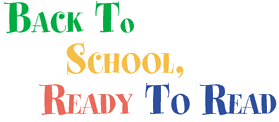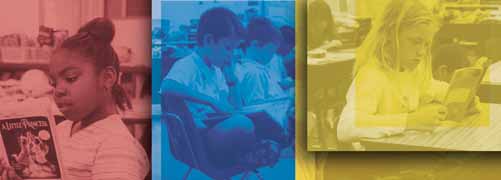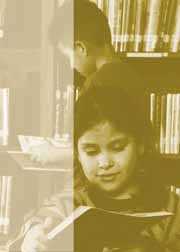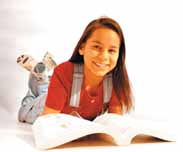"Last year, I was having trouble," says Meghan, who completed eighth grade last spring at the University of Florida's P.K. Yonge Developmental Research School. "I would read things and maybe the last line is all I remembered. It was hard for me to take it and make it into a summary in my head. I had trouble understanding what I was reading. I felt really frustrated and was like, ‘How can everyone else do this and not me?'". Because her reading scores on standardized tests were low — and because teachers noticed that her grades were beginning to slip — Meghan was invited to join Summer Adventures in Literacy (SAIL), a four-week experimental summer reading program developed at the University of Florida for struggling readers, funded by a grant from the U.S. Office of Special Education Programs..
Meghan is not alone. At the University of Florida, researchers are making giant strides toward improving the reading skills of millions of children like Meghan across the country. "Your ability to read and understand what you're reading, to make sense of it and make connections and to put together information, is a critical skill these days," says Lynda Hayes, a teacher at P.K. Yonge who has spearheaded the school's reading initiatives and co-founded SAIL. "There are very few jobs that don't require some reading ability. We have a society that is changing very rapidly now, and one of the ways you continue to learn is through reading." SAIL is just one of many programs that are helping to level the field for Florida students — and pave the way for education reform that could spread throughout the country. The College of Education has recently received several major grants to study and implement reading initiatives that could have a significant impact. "I find it hard to imagine life without being able to read," says Richard Allington, a professor of teaching and learning who recently received a $750,000 grant to study summer reading loss. "In addition, in this age of unfettered information flow, I think it is more essential than ever to have a highly literate citizenry, and part of the new challenge is that they cannot just read words but they must evaluate what they are reading for its veracity and reliability."
Allington says that although Florida has historically trailed many other states in reading — and ranked in the bottom tier nationally for education funding, UF is moving to close the state's reading gap. Holly Lane, a special education professor in the College of Education, is in the second year of running Project UFLI, a reading tutoring program funded through the Office for Special Education Programs of the U.S. Department of Education. "The reading programs we at UF are running now are putting us on the map," she says. "With the recent federally funded grants we've received, we have the potential to make a real impact in the future." In fact, says Ben Nelms, who recently stepped down as interim dean of the College of Education, the potential to make an impact is ever expanding. "We have some of the top literacy scholars in the country here at UF," he says. "Just as importantly, we have faculty who are absolutely determined to provide outreach to struggling schools and struggling students and to follow up with research to determine that what we are doing is effective." SAILing Through Books
"We wanted to do something about reading loss during the summer among kids who were reading below the 50th percentile," says Hayes. "We had people at the table who came at solutions for that challenge in different directions, so what evolved was a program that was a little more like summer camp, a little less like school. "Typically, middle school students' summer courses are put together for kids who fail a course during the school year," Hayes adds. "One of the big differences with this project was that it focused on building their reading skills and strategy rather than correcting failures." Students who participated in the first SAIL program, implemented at P.K. Yonge in the summer of 1999, showed significant gains in reading ability. Now Hayes and her colleagues have expanded the program into several schools in Alachua County and into three rural middle schools in northeast Florida, in a district where a large percentage of students are below the 39th percentile on standardized reading tests. "We looked for rural schools that had high poverty and low achievement," Hayes says. "We run three different variations to see where you get the most bang for your buck if your funds are limited and you need to see an improvement in reading skills." A rigorous evaluation program of pre- and post-testing indicates that the program works, even at traditionally underperforming schools, Hayes says. "There has been research before that has shown that students lose ground over the summer, and our findings are consistent with that and strongly support the need for summer reading programs for middle grade readers, who tend to be very neglected," she says. "So what we can show is that we have kids making some pretty major gains in a very short amount of time." With its demonstrated success and the backing of the U.S. Department of Education, Hayes says SAIL has the potential to have a widespread national impact. "The point of the grant is to understand what schools do to raise the reading comprehension achievement," Hayes says. "It would be nice if summer programs began being funded nationally. We hope that our program will have some national impact." Home LibraryEducation leaders have spent years trying to close the so-called "achievement gap" between rich and poor students, but when it comes to reading, Allington has a simple solution. "Poor kids lose ground in reading over the summer. Rich and middle-class kids don't," Allington says. "The reason is that rich kids tend to own books. Poor kids get most of their books, 90 percent or more, from the schools, like the school or classroom library." To give poorer students the same opportunities, Allington and education Professor Anne McGill-Franzen are using a $750,000 grant from the U.S. Department of Education's Office of Educational Research and Improvement to put more books in the hands of low-income elementary school students. "For every two and a half years of school, the poorer kids have lost a year's worth of reading, so by fifth grade, they're two years behind the higher-income kids," Allington says. "With all the pressure to close the achievement gap between rich and poor children, one of the aspects that has been neglected is this summer reading setback." To tackle the problem, Allington and McGill-Franzen selected more than 2,000 low-income first- and second-grade children from Duval County and Belle Glade for an empirical study of how book ownership affects summer reading loss. "Kids were identified to receive a dozen free books on the last day of school last spring. We held book fairs for them to choose their own books, books that interest them," Allington says. "Another group of kids got puzzle books but not reading materials. We'll follow all the kids for three years, using the fourth- and fifth-grade FCAT scores as the primary measure of reading ability. Theoretically, if just getting kids books will help, they should be reading a year or more better by the end of the study than the kids who didn't get to read."
If the program is successful, it could have a huge impact on education and reading throughout the nation, Allington says. Targeting TutorsLane is also trying to devise a low-cost method to help kids increase their reading ability with Project UFLI: the University of Florida Literacy Initiative. Unlike SAIL and the summer literacy program, both of which directly target students, Project UFLI targets teachers and tutors, training them inexpensively in effective methods of coaching.
"Most tutoring programs out there are expensive to implement because there is extensive training for tutors," Lane says."Although training is critically important for tutors and teachers, you can get it done in a week rather than a year with our method. It may not work with all of the kids, but if some can be tutored with the lower-cost model, then think of the money we've saved. It could be available to so many more children." Hayes, who worked on Project UFLI with Lane, says "You can't teacher-proof an education. They are the people on the front lines." Project UFLI focuses on helping teachers and tutors to understand the reading process — how children learn how to read, what kinds of difficulties many children encounter, and what they can do to help struggling students learn to read — Lane says. "The model is designed for one-on-one use with struggling beginning readers, typically first-grade students," Lane explains. "During each session, the student reads familiar text to build fluency, builds decoding skills through work with manipulative letters, composes a written message, reads a new book with tutor coaching, and explores various genres of text." More than 200 teachers statewide are using the program, as are two school districts in North Carolina. Project UFLI is in its second year, and, so far, results have been impressive. Principals at schools where the program is in use have reported giant strides in reading achievement, Lane says. "The research that has been done has taught us so much about teaching reading effectively," Lane says. "To learn more about that and help teachers understand it is one of the most important things we can do. If they can learn to tutor one child, it will benefit them in terms of understanding all about reading problems. When they go back to the classroom, they can be that much more effective with the rest of the kids." Programs like the many being pursued by the University of Florida are vitally important to the future success of Florida children. "Of course, we here at the College of Education think that literacy is one of the most important aspects of education we are dealing with, especially in elementary and secondary schools," says Nelms. "Test scores and other valid indications show how much students still need to learn to become successful readers. I think the work the College of Education is doing is exemplary." Researchers at UF are demonstrating that only minimal monetary investments may be needed to correct a widespread and devastating problem. "Among kids with learning disabilities, close to 100 percent have reading problems," Lane explains. "For most of them, it was never a matter of not having the basic skills to read; it was a matter of being taught what they needed. With good teaching, they can catch up." Reading proficiency is more important now than ever, Allington says. "With the proliferation of the Internet, 24-hour news channels and the many magazines and newspapers we have access to, suddenly more people have, at their fingertips, information that is unchecked, unfettered and often unedited," he says. "We can't just teach them the words and not teach them to think about them. It's very important that we teach them how to read and how to think about what they've read."
With the recent development of reading programs with national significance, UF is stepping up to play a role in one of the most important educational issues at the dawn of the 21st century. "Reading is such a huge issue," Hayes says. "The bar has gone up. There is an expectation that all children can learn to read and all children will learn to read and be proficient readers. If that bar has gone up, it puts pressure on all of us. We're talking about equal rights, and reading as a central, basic right. I think we have our feet to the fire right now to make a contribution to meet this challenge that is out there."
Lynda F. Hayes
Richard L. Allington
Holly B. Lane
Related Web site:
|


 "After the SAIL program, it was like, gosh, I like this," Meghan says. "I comprehend things much better, and I'm making great grades now in language arts and reading. In the past, I never liked to read. Now I can find a book that's really interesting and I can read it and enjoy it. I had never been able to do that before."
"After the SAIL program, it was like, gosh, I like this," Meghan says. "I comprehend things much better, and I'm making great grades now in language arts and reading. In the past, I never liked to read. Now I can find a book that's really interesting and I can read it and enjoy it. I had never been able to do that before."
 SAIL, funded by a $540,000, three-year grant from the U.S. Office of Special Education Programs, is a large part of the joint reading initiative effort launched by the College of Education and P.K. Yonge.
SAIL, funded by a $540,000, three-year grant from the U.S. Office of Special Education Programs, is a large part of the joint reading initiative effort launched by the College of Education and P.K. Yonge.
